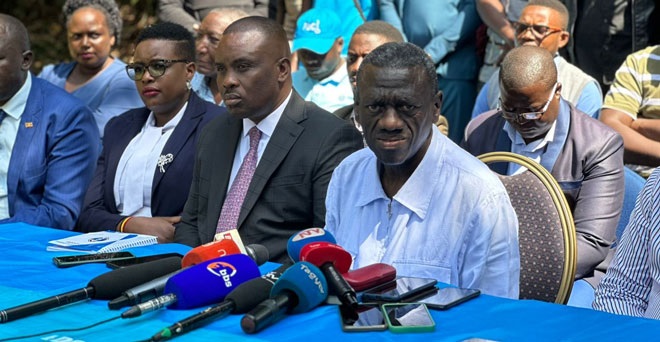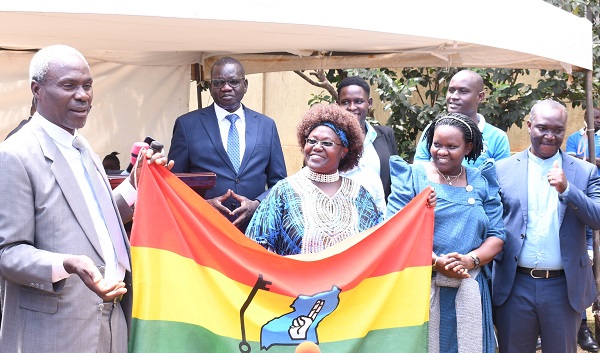
Why Dr. Besigye’s party could be no more by 2026
Kampala, Uganda | IAN KATUSIIME | 2024 is the year the Forum for Democratic Change (FDC) marks twenty years. Ideally, it should have been a milestone for the first major opposition party in the era of multiparty politics. Instead the party of Dr. Kizza Besigye appears to be under the claws of the ruling National Resistance Movement (NRM) following in the footsteps of an even older opposition party, the Uganda Political Congress (UPC) which entered an MoU with NRM in 2022.
On Feb. 8, FDC took a step that has become synonymous with NRM: it held a meeting with the family of the late Cecilia Ogwal to have her daughter, Rosemary Alwoc, succeed her as the Woman MP of Dokolo District. The decision drew sharp criticism from party supporters and outsiders because typically when an MP on the NRM ticket passes on, their offspring takes over.
On Feb. 14, FDC president Patrick Amuriat proudly unveiled Alwoc at the party headquarters as the party flag bearer for the Dokolo by-election. Reports also suggested that FDC had requested UPC that she be the only opposition candidate.
The party whose flag Besigye carried as a presidential candidate in three elections has borrowed a page from NRM’s playbook of succession politics when it fronted the daughter of Ogwal, a veteran opposition politician to take over her seat.
Besigye is now more associated with the National Unity Platform (NUP) the party founded by Robert Kaygulanyi aka Bobi Wine. The two came together in January under the banner ‘United Forces of Change’ to protest the state of roads in the city. The protests also had leaders from Alliance for National Transformation (ANT). Missing from the action were FDC leaders who have stayed put at the party headquarters in Najjanakumbi.
It was a sign of the different path the new FDC has taken from the one that holds its affairs at Katonga Road in the city centre.
But the cracks in FDC came into public view when Besigye, first party president, disagreed with his protégé and current party president, Patrick Oboi Amuriat and renowned FDC honcho, Nandala Mafabi over allegation of money from State House influencing party affairs.
Besigye has since distanced himself from FDC. So have his lieutenants like firebrand Kira Municipality MP Ibrahim Semujju, Kampala Lord Mayor Erias Lukwago and his deputy Doreen Nyanjura.
In December during a television interview, Besigye said what the FDC leadership should have done to promote unity. “What they needed to have done is to subject their views to a democratic process within the party. To call for a national delegates conference, this is what we suggest and we discuss it transparently.”
With the 2026 election beckoning, it is not clear who will be the party’s flag-bearer? Amuriat, a lackluster politician propped up by Besigye or the ever cunning Nandala who is the puppet master in charge of FDC and now serving his fifth term as MP for Budadiri County West?
During the FDC bust up last year, Semujju accused Nandala and Oboi of intending to sell the party to President Yoweri Museveni, chairman of NRM. FDC diehards say the Nandala and Oboi pair are in cahoots with NRM over money and plum positions in government. FDC MPs are divided on the matter and some have not come out publicly to state their positions on the bickering.
But some like Mawokota South County MP Yusuf Nsibambi have not been shy about it. Nandala installed Nsibambi as the FDC whip in parliament ousting Semujju, a Besigye ally and a politician who has always been FDC at heart.

After Nsibambi’s appointment, a section of FDC MPs led by Buhweju County MP, Francis Mwijukye, petitioned Speaker Anita Among in August 2023 challenging the appointment. However, Among later cleared Nsibambi in a sign of the deep divisions rocking the FDC house. Other politicians like Robert Centenary, a former MP from Kasese have stood with the new leadership.
Die hard FDC supporters who are disgruntled are considering jumping ship. “I will leave the party and I will be engaged in forming a new one if other comrades agree,” Brian Atuheire aka Unstoppable told The Independent.
Unstoppable has been a card carrying member for the party since 2008. He has taken part in numerous protests in the country and also got arrested and jailed. He feels the FDC he signed up for is not the one being run by Nandala and Amuriat.
FDC early days
Since its founding in 2004, FDC has operated in murky terrain as the major opposition party. It is difficult to raise money from its MPs, party members and businesspeople while also trying to win elections at parliament and presidential level.
The State has always been ready to exert its full weight on any individual or business suspecting of supporting the party financially. With all these constraints, members of FDC became easy targets for Museveni to lure away with cash, jobs and ministerial appointments.
Some of the big fish Museveni has scooped from FDC are Beti Kamya, Beatrice Anywar, Thomas Tayebwa, Anita Among and Joyce Ssebugwawo. The five have all taken up juicy offers in the NRM government in the last eight years. It is expected more will cross in the foreseeable future now that the FDC is going through its deepest crisis.
By the time the last big shot Ssebugwawo crossed over to government, FDC had already been eclipsed by the People Power Movement led by Bobi Wine which went a step further to register a party officially as NUP.
FDC has always had donors from within Uganda and abroad and the source is always a contentious issue depending on whom you ask. In four elections; 2001, 2006, 2011 and 2016, Besigye was a presidential candidate who gave President Museveni a run for his money. In the last three, Besigye ran on the FDC ticket maintaining FDC as a dominant force in Ugandan politic. In 2001, Besigye scored 27% representing 2million votes against Museveni’s 69% with 5million votes.
In 2005, Besigye was nominated from jail while facing charges of treason, misprision of treason, rape, and illegal possession of weapons. FDC had been launched the year before while Besigye was in exile in South Africa.
There was strong consensus about Besigye being its presidential candidate because of his political pedigree: he had stood in 2001 and roiled the NRA state provoking fierce backlash from the state that led to violence and arrests of his agents and ultimately drove him to exile.
From 2001, various political actors were agitating for a way forward and as a result, Parliament Advocacy Forum (PAFO) and Reform Agenda came together to form FDC. Politicians like Reagan Okumu, Ogenga Latigo, John Kazoora, Augustine Ruzindana, Miria Matembe, Abdul Katuntu, Salamu Musumba Jack Sabiti, James Garuga Musinguzi, and Amanya Mushega converged to form the party. A good number had been MPs; from the Movement and from the Opposition when the country was under the single party system.
In 2006, Besigye ran his second time against Museveni and polled 37% with a 2.5million vote tally with Museveni getting 59% representing 4.1million votes. In 2011, Besigye got 26% with 2million votes and 2016, he improved his output by bagging 35% with 3.5million votes. Between 2011 and 2016, Museveni’s vote percentage fell from 68-60%.
2017 FDC elections
The national delegates’ conference held at Namboole in November 2017 marked a new chapter as FDC elected Amuriat, who had Besigye and Nandala’s backing. Those disgruntled with then FDC president Mugisha Muntu, had already formed the Katonga Road Office and Amurait then belonged to the latter branch.
The election of Amuriat was a reversal of the 2012 delegates’ conference where Muntu beat a Besigye-backed Nandala, in an election where Muntu was branded a mole. In 2018, Muntu formally quit the party and founded Alliance for National Transformation.
Amuriat, a little known politician who had kept by Besigye’s side triumphed over Muntu, a well-known national figure in an election where FDC ideological differences played out again. In all the maneuvering, Besigye has been the common denominator- a reason he stepped down from the party presidency in 2012.
Amuriat was Kumi County MP from 2001-2016 and also a founder member of FDC as part of PAFO. However according to analysts, he has failed to fit in Besigye’s shoes who still towers over the party as its North Star. In 2021, Amuriat contested for president and perhaps the only memorable thing about his campaign was his arrest after nomination where police confiscated his shoes and in protest, he ran a barefooted campaign.
He scored a measly 3.26% in perhaps a campaign that many FDC supporters would want to forget. For now, FDC supporters; Najjanakumbi and Katonga factions appear to be watching the space waiting for which card to play.
 The Independent Uganda: You get the Truth we Pay the Price
The Independent Uganda: You get the Truth we Pay the Price



